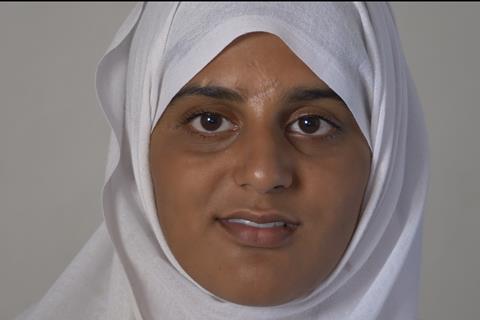Dilligent, focused and thought-provoking portrait of notorious British jihadist Tooba Gondal

Dir: Benedetta Argentieri. Italy. 2022. 90 mins
The eponymous subject of Benedetta Argentieri’s documentary The Matchmaker is notorious jihadist Tooba Gondal, who abandoned undergraduate studies in London to join the Islamic State. Under the nom de guerre of Umm Muthanna al-Britannia, Gondal declared her conversion in March 2015 by posting a photograph on Twitter showing her wearing a burqa while brandishing an AK47. It was captioned: “Living the life of real freedom.” Largely comprised of interviews conducted with Gondal in 2019, the documentary is a scrupulous attempt to understand how a university student became a prolific ISIS propagandist and alleged recruiter within a wider investigation of the roles of women in the Islamic State.
Argentieri stops short of overtly challenging Gondal’s sheer lack of accountability, but does capture many contradictions
Showing out of competition at the Venice Film Festival, The Matchmaker will prompt discussion pertaining to whether Gondal’s claim of self-deradicalization can be taken at face value based on testimony that is extensive yet also vague and even evasive. If COVID-related delays mean that her story has taken further turns since most of the footage was recorded (the French-born Gondal has been deported from Turkey to France as part of repatriation attempt), the documentary’s wider inquiry has a continued relevance which will generate interest from specialist distributors.
The photograph of Gondak with the Ak47 is seen early in The Matchmaker, but does not become the focus of conversation with the subject until one hour later in order to provide her with some room for reflection. The film instead starts with the 2019 Battle of Baghuz Fawqani, which saw a coalition led by the Syrian Kurds defeat the last stronghold of the Islamic State in Syria. They also captured around 12,000 women and children from 48 countries who were denied repatriation. Many were detained at the Ain Issa refugee camp, which is where Argentieri encounters Gondal and her two offspring.
By this point absent from the Internet for several years, Gondal projects a friendly demeanour that is the polar opposite of her fiercely combative online identity. She recalls her disillusionment with upper-middle-class UK life, becoming radicalised through Twitter, and her years in the Islamic State during which she was married three times to husbands who were all killed while fighting for the terror group.
In addition, Argentieri talks to Syrian Democratic Forces operation commander Aryian Qamishlo and several Yazidi women who were abducted by ISIS. All vigorously contest the view that women in the jihad are not active participants by explaining that they are actually involved in military activities and run the slave trade. The only male interviewee here is the academic Simon Cottee, who specialises in terrorism studies and has been keeping track of Gondal since 2015.
Nonetheless, it’s Gondal who receives most of the screen time. In this respect, the initial hour may not be particularly revealing for anyone who has read Cottee’s 2016 Vice article “How a British College Student Became an ISIS Matchmaker” which drew heavily on Gondal’s blogs and Twitter feed. It is, however, a strong example of the process that a filmmaker goes through to build a rapport with their subject, especially one with whom they have considerable differences to say the least.
Argentieri does not only see women as victims in war, while Gondal is keen to perpetuate – and arguably inhabit – the submissive stereotype. This means that Gondal’s recollections become hazy when asked about her digital extremism and whether she had lured women from the West to marry jihadist fighters. Argentieri stops short of overtly challenging Gondal’s sheer lack of accountability, but does capture many contradictions and indirectly counters her claims of female passivity within the Islamic State via the harrowing accounts of former slaves. One of these survivors also mentions what may be Godal’s strategy: “The ISIS women will play all innocent, so that they can walk away freely.”
Although it primarily examines probably the most infamous detainee at Ain Issa, the documentary also provides a nightmarish glimpse of diplomatic limbo by surveying the shantytown environment of the camp. This also indicates the deeply troubling extent of Western female participation in Jihadism. Upon arrival, Argentieri interacts with a Russian captive who desperately calls on Vladimir Putin to come to her aid, and a mosaic approach may have yielded more insight with regards to the involvement of Western women in this militant movement. Yet the documentarian’s background in independent journalism ensures that The Matchmaker raises pertinent questions and maintains an unwavering focus, even if painstaking efforts to extract detail bump up against broad claims of “brainwashing”.
Aside from graphics that illustrate Twitter feeds or concisely explain relevant Islamic practices, The Matchmaker is assembled in an unvarnished manner. Use of propaganda videos and extremist posts provides a disturbing sense of how such movements insidiously thrive online, but editors Matteo Mossi and Serena Pichi avoid bombarding the viewer to ensure that the interview content receives undivided attention.
Production company: Fandango
International sales: Fandango, raffaella.digiulio@fandango.it
Producers: Domenico Procacci, Laura Paolucci
Screenplay: Benedetta Argentieri, Maria Edgarda Marcucci
Editing: Matteo Mossi, Serena Pichi
Music: Gian Luigi Carlone






![The Brightest SunScreen[Courtesy HKIFF]](https://d1nslcd7m2225b.cloudfront.net/Pictures/274x183/3/5/0/1448350_thebrightestsunscreencourtesyhkiff_312678.jpg)















![The Brightest SunScreen[Courtesy HKIFF]](https://d1nslcd7m2225b.cloudfront.net/Pictures/100x67/3/5/0/1448350_thebrightestsunscreencourtesyhkiff_312678.jpg)

